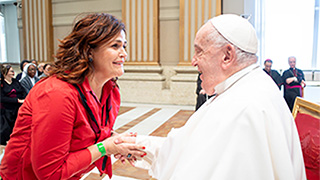Robert Mayhew Makes Sense of Ancient Aristotelian Ideas in Modern Times
Wednesday, March 27, 2024

Professor Robert Mayhew
As a young man in junior high school, prominent philosopher, and professor, Robert Mayhew, Ph.D., became very interested in dystopian fiction. He recalls reading Orwell’s Animal Farm and 1984, Huxley’s Brave New World, Rand’s Anthem, and Zamyatin’s We. "This was what first prompted me to think about, and regard as important, philosophical issues, though I wouldn’t have called them that at the time," says Mayhew, who specializes in ancient Greek philosophy.
He believed he was interested in political thought, but while working on a Ph.D. in political science at Georgetown, Mayhew concluded that his interest in political philosophy was rooted in an interest in deeper questions. Ultimately, he says, the Department of Philosophy at Seton Hall was where he belonged.
In the many years since university, Mayhew has authored books and a myriad of scholarly articles on Greek philosophy, focusing much of his work and teaching on Aristotle. He wrote Aristotle’s Lost Homeric Problems (Oxford University Press 2019) and Theophrastus: On Winds (Brill 2018), the volume he co-edited Clearchus of Soli: Text, Translation, and Discussion (Routledge 2022).
"Aristotle is certainly my favorite ancient philosopher," notes Mayhew. "Ayn Rand is the only modern figure whose life and works I have published on, and she is certainly my favorite (though that will win me no friends in academia, alas)," he jokes.
To engage students and make ancient philosophy more accessible to modern learners, Mayhew reframes the ideas written so long ago in the present. "I try to stress to the students that philosophy deals with perennial issues, and that most of the questions that concerned Plato, Aristotle, and Augustine are still around today, and are still important today," he says. "They are not mere historical curiosities."
At Seton Hall, Mayhew regards the teaching of young minds and research on Greek philosophy translations with equal import, but it is the process of deciphering of early philosophical thought that motivates him towards lifelong learning. "When you get in on the ground floor, studying some neglected ancient text or working on a new translation, it’s very exciting," he said in a 2022 interview.
An expert in unraveling the mysteries of ancient thought, Mayhew described his research process. "I usually begin by trying to come to a conclusion about how the key terms should be translated,” he shares. "I then isolate some section of the work and come to conclusions about the state of the Greek text. What manuscript variations are there; is the text corrupt and in need of editorial conjectures; what have past scholars had to say about the text?"
The process he follows is detailed and lengthy, involving Greek to English rough translations, refining the English interpretation and then comparisons to how other scholars have interpreted the text. "From the beginning, I have tended to choose more obscure works (or parts of works), so that I could focus on the ancient thinker and work itself, and not on the secondary literature on it," Mayhew points out.
Indeed, he chose to write about Aristotle’s criticism of Plato’s Republic, in the second book of his Politics, for his dissertation. "Although the Politics has received a great deal of scholarly attention, this part of the Politics had not," says Mayhew. "I continue to be drawn, for the most part, to neglected works, most recently the works of Aristotle’s students, colleagues and followers, and the fragments of Aristotle’s lost works." But, Mayhew notes, "Aristotle’s Greek is very tough. Sometimes things are moving along smoothly, and I translate 20 lines in an hour, only to run into a monster sentence that takes 2 hours to untangle."
Presently, Mayhew is editing the Greek text, and translating into English, four works by Aristotle (or attributed to him) to be published in various volumes of the Loeb Classical Library (Harvard University Press): Aristotle’s Eudemian Ethics, and the On Virtue, On Marvelous Things Heard, and Positions and Names of the Winds. "I am also working on an edition of the Greek and Latin texts, with translation and commentary, of the fragments of Aristotle’s lost Zoϊka (Animal Matters),” he shares. His work on Zoika has attracted international interest, and as a result, Mayhew will be a visiting scholar this May at the University of Padua, where he will give two talks on the subject.
It is shaping up to be a busy summer for the study of fundamental questions about the nature of reality: soon after, Mayhew will be presenting a lecture at the University of Lyon, "Eudemus and Alexander of Aphrodisias against the idea of an infinite universe," at a conference on Aristotelian physics after Theophrastus.
In his work as a professor, Mayhew emphasizes the importance of guiding students in how to think critically about fundamental issues, rather than telling them what to think. "When I was an undergraduate, I loathed and resented those professors (especially in the humanities and social sciences) who in my view took the purpose of teaching to be to indoctrinate their students," recalls Mayhew. He strives to be different. "I’ve never forgotten that, and so I have tried, to the best of my ability, to leave my own views out of my presentation of philosophical issues."
Mayhew, however, says he makes two exceptions: "I am quite open about my views on the importance and value of reason and of philosophy. And that’s what I hope my students take away from my classes: That philosophy is crucially important (and interesting as well), and that reason is the ultimate arbiter in deciding the truth on philosophical issues."
Categories: Education, Research





